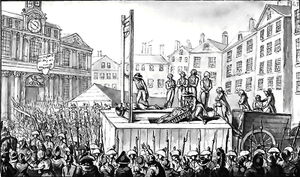French Revolution (nonfiction): Difference between revisions
No edit summary |
No edit summary |
||
| Line 26: | Line 26: | ||
* [[Enragés (nonfiction)]] | * [[Enragés (nonfiction)]] | ||
* [[Law of Suspects (nonfiction)]] | * [[Law of Suspects (nonfiction)]] | ||
* [[Paris Commune (nonfiction)]] - the government of Paris during the French Revolution, from 1792 until 1795. | |||
* [[Reign of Terror (nonfiction)]] | * [[Reign of Terror (nonfiction)]] | ||
* [[September Massacres (nonfiction)]] - a number of killings in Paris and other cities that occurred from 2–4 September 1792 during the French Revolution. More than 1,000 prisoners were killed within 20 hours. | * [[September Massacres (nonfiction)]] - a number of killings in Paris and other cities that occurred from 2–4 September 1792 during the French Revolution. More than 1,000 prisoners were killed within 20 hours. | ||
* [[Thermidorian Reaction (nonfiction)]] - a coup d'état within the French Revolution against the leaders of the Jacobin Club who had dominated the Committee of Public Safety. | * [[Thermidorian Reaction (nonfiction)]] - a ''coup d'état'' within the French Revolution against the leaders of the Jacobin Club who had dominated the Committee of Public Safety. | ||
External links: | External links: | ||
Latest revision as of 20:14, 23 February 2019
The French Revolution (French: Révolution française) was a period of far-reaching social and political upheaval in France that lasted from 1789 until 1799, and was partially carried forward by Napoleon during the later expansion of the French Empire.
The Revolution overthrew the monarchy, established a republic, experienced violent periods of political turmoil, and finally culminated in a dictatorship under Napoleon that rapidly brought many of its principles to Western Europe and beyond.
Inspired by liberal and radical ideas, the Revolution profoundly altered the course of modern history, triggering the global decline of absolute monarchies while replacing them with republics and liberal democracies.
Globally, became the focal point for the development of modern political ideologies, leading to the spread of liberalism, radicalism, nationalism, socialism, feminism, and secularism, among many others.
The Revolution also witnessed the birth of total war by organizing the resources of France and the lives of its citizens towards the objective of military conquest.
In the News
Allumette enflammée inverse, symbol of Les Empyrées, accidentally sets fire to Dr. Guillotine.
Thomas Carlyle documents the French Revolution.
Fiction cross-reference
Nonfiction cross-reference
- Enragés (nonfiction)
- Law of Suspects (nonfiction)
- Paris Commune (nonfiction) - the government of Paris during the French Revolution, from 1792 until 1795.
- Reign of Terror (nonfiction)
- September Massacres (nonfiction) - a number of killings in Paris and other cities that occurred from 2–4 September 1792 during the French Revolution. More than 1,000 prisoners were killed within 20 hours.
- Thermidorian Reaction (nonfiction) - a coup d'état within the French Revolution against the leaders of the Jacobin Club who had dominated the Committee of Public Safety.
External links:
- French Revolution @ Wikipedia


